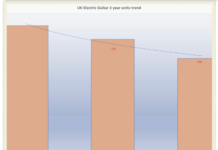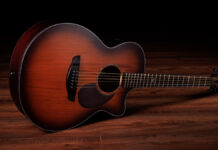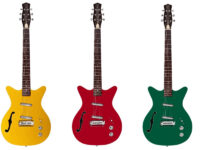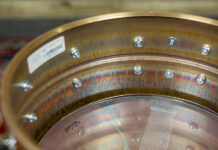
Judas Priest Still Packing 'Firepower': Rob Halford, Richie Faulkner and Glenn Tipton Talk New Album
It was supposed to be a period of celebration, not turmoil, and Judas Priest seemed to be having a great time.
Vocalist Rob Halford and guitarist Richie Faulkner had flown to New York to plug their newly completed album, Firepower, the first in which Faulkner played a major songwriting role. The band’s other guitarist, Glenn Tipton—who had not yet announced that he had been suffering for years with Parkinson’s disease and would not be joining Priest on the Firepower tour—was apparently still in England working on the final mixes with recording engineer Mike Exeter.
Whether they were ecstatic to finally be out of the studio or were simply holding their cards close to the vest, Halford and Faulkner didn’t give any indication that something was amiss. They were both upbeat and filled with enthusiasm, joking with label staff and reveling in the afterglow of their latest creation.
“I really love the song ‘Spectre,’ which has a real ‘Ripper’-esque breakdown that’s great!” Faulkner exclaims from a black couch in his record label conference room shortly after a press screening of the album. “From there, it goes into a guitar solo, and then another guitar solo and then a harmony solo. We weren’t shooting for radio play, so we weren’t bound by any formula. We just had fun with it and went where the songs took us.”
Unlike Faulkner’s recording debut, 2014’s Redeemer of Souls, nothing on Firepower feels formulaic. There’s an element of excitement and discovery throughout that Priest haven’t displayed in more than 10 years.
Faulkner admits he wrote his parts on Redeemer of Souls to fit a band template, and it’s noticeable. By contrast, on Firepower he just sounds like a skilled guitarist influenced by Priest, but also by numerous other hard rock and metal players.
From the muted, power-chord riffage and double-bass drumming of the title track to the delicate, atmospheric arpeggios and countermelodies of the cinematic near-ballad “Sea of Red,” Firepower is epic and enthralling—riddled with metal turmoil yet resounding with optimism.
“That’s the thing with Priest,” interjects Halford from an adjacent chair, unconsciously rubbing his well-groomed beard. “There’s always an element of hope within the chaos. It’s like with most great, passionate art. Whether you’re talking about Star Wars or Priest, in the end, hope wins. Love wins. In the end, the true core and essence of humanity survives, no matter how much shit you throw at it or how much you think it’s been destroyed. We emerge triumphant.”
Equal parts battle cry and victory march, Firepower resonates with the spirit of some of Priest’s most anthemic albums, including 1978’s Hell Bent for Leather, 1982’s Screaming for Vengeance and 1984’s Defenders of the Faith.
“We knew we had to record a very powerful album, and I think we achieved it,” Tipton says over the phone from his home in the Midlands, England. “We wanted to do a no-nonsense, heavy metal album that was very much Judas Priest.”
“The mantra we had was ‘classic heavy fucking metal,’ ” Halford adds, pounding a fist on the table for dramatic effect. “There’d be days when the guys would go, ‘Oh, this is a great riff,’ and I’d say, ‘No, it’s not heavy enough.’ With every song, we had to keep coming back to that pillar of dedication.”
That doesn’t mean Firepower is all power and no finesse. “Lightning Strikes,” “Firepower,” “Evil Never Dies” and “Flamethrower” go straight for the jugular, but the slow, doomy “Children of the Sun,” the spectral, balladic “Sea of Red” and the singalong rocker “Never the Heroes” showcase a less aggressive side of the band.
“There was a definite consensus to be heavy,” explains Faulkner, who was born in London and played in Iron Maiden bassist Steve Harris’ daughter Lauren’s solo band before joining Priest. “But heavy means so many different things. It could be heavy lyrical content. It could have a heavy vibe. It could be something detuned and dissonant. And it was interesting to see things that maybe weren’t heavy in the beginning progress into these heavier songs.”
Back when Faulkner worked with Priest on Redeemer of Souls, he had only been in the band a few years and working with his childhood heroes still felt like winning a contest. On Firepower, Faulkner had an urgent need to prove himself—to show that he deserved to work alongside Tipton and Halford—and could inject his own style into the band as well as play note-perfect versions of their classics.
“This one definitely felt more serious for me,” he explains. “I felt a bit more, ‘Right, stop fanboying. You’ve been in the band seven years. Now, show ’em what you’ve got.’ ”
Over a six-month period, Faulkner spent many long nights with his white 1976 Les Paul Custom, laying down different riffs, licks and arpeggios. Many were brand new, but some came from other projects. “Sea of Red” started with a passage he wrote for a band he was in when he was 17, the foundation of “Guardians” was composed in 2008 but never used and part of “Spectre” came from the extended solo spot he played onstage when the band toured in 2011. While Faulkner composed at his home in South Florida, Tipton wrote in his own studio. The guitarists didn’t share any ideas until mid-2016 when Faulkner and Halford traveled to the Midlands, England, for the first of several writing sessions.
Even though he was well-prepared when he arrived, Faulkner was fidgety and anxious. When Tipton connected a pair of speakers to his mixing desk and switched on a hard drive filled with Faulkner’s new ideas, his anxiety turned to near-panic.
“I see Rob Halford and Glenn Tipton sitting there listening to my demos and I’m looking at the knobs thinking, What have I done? What have I done?!? What was I thinking!?! Faulkner admits, then smiles. “You’re stepping into uncharted territory and the amygdala in your brain kicks in, telling you, ‘No, stop!’ because you’re in fight-or-flight mode, but you’ve got to push through it. And dude, it’s the most intimidating thing.”
He needn’t have worried. Not only were Tipton and Halford receptive to his ideas, they were galvanized by his enthusiasm and amazed by his knack for writing parts that complimented Tipton’s riffs. “I find all of Richie’s ideas to be very in tune with my own, and that makes it a real pleasure to work together,” Tipton says. “And it was refreshing because I get to work with parts that I didn’t write and I wasn’t familiar with.”
“There was so much excitement going on in the room when we were writing,” Halford adds. “There were so many ideas and the chemistry was so good that I’d wake up in the morning and go, ‘I can’t wait to get to the studio today.” And that feeling was very prominent in all of us.”
With all the demos completed, Judas Priest returned to the Midlands in March 2017 to start recording. They wanted Firepower to have a vintage sound, so they recruited producer Tom Allom, who worked on every Priest album between 1980’s British Steel and 1988’s Ram It Down. They also wanted to work with a more contemporary producer, so they invited Andy Sneap (who is now filling in for Tipton for the Firepower tour). Finally, the band hired Mark Exeter—who produced Redeemer of Souls with Tipton—to engineer.
“We were struggling with who to use, and I think it was Glenn who said, ‘Let’s get them all,’ Faulkner says. “They each brought something great to the record and there were no ego battles at all.”
To track his rhythms, Faulkner used the same Les Paul he wrote with and played on the last two Judas Priest tours. He played the distorted passages through a combination of a Marshall JCM800, Marshall JVM, Peavey EVH 5150 and Engl Powerball. For clean segments and layering, he played a Telecaster through a Roland JC-120.
“I know a lot of people don’t consider that a metal guitar, but neither was a Stratocaster until Hendrix picked it up,” Falkner says.
Tipton mostly used a combination of his Custom ESP LTD GT-600 Viper signature series guitar in the shape of an SG, and his old Hamer customized guitars. He also used a variety of Fenders.
“You’re going to use a different guitar for a very slow and powerful song like ‘Children of the Sun’ than you’re going to use for ‘Lightning Strikes’ or ‘Firepower,’ which are much fiercer,” he says. “So, it’s just a case of hunting around like a mad professor in the studio trying different leads, guitars, amps until you get the sound you want.”
For amps, Tipton used an Engl Invader, but he also experimented with Marshalls and EVHs. “You’d think after 40 years it would be easy for us to get a guitar sound, but that’s not necessarily the case,” he says. “You can use the same guitar in the same room with the same amps, but if it’s a different song you might go, ‘Well, this isn’t quite right.’ You have to work at it again. And we worked very hard to get the right guitar sounds for this album.”
For Tipton, tracking his leads was simply a matter of following his instincts and loosely adhering to the formula that’s worked for years. He composed everything on the spot on his ESPs and sometimes his Hamers. “I always enjoy recording the solos more than any other part of the process,” he said. “It’s where the album takes on its final identity and shifts into place.”
Faulkner pre-wrote some of his solos but improvised others. He used his go-to Marshalls and Les Paul, as well as a ’79 Flying V and a ’63 Strat to provide extra tone.
It’s understandable that Tipton didn’t mention Parkinson’s when Priest were promoting Firepower. At the time, he still seemed to be managing his condition. He was far more affected by it than he had been when he contracted Parkinson’s 15 years or so earlier, but he played an abundance of fleet-fingered leads throughout Firepower and was planning to tour with the band until about a month before the first show.
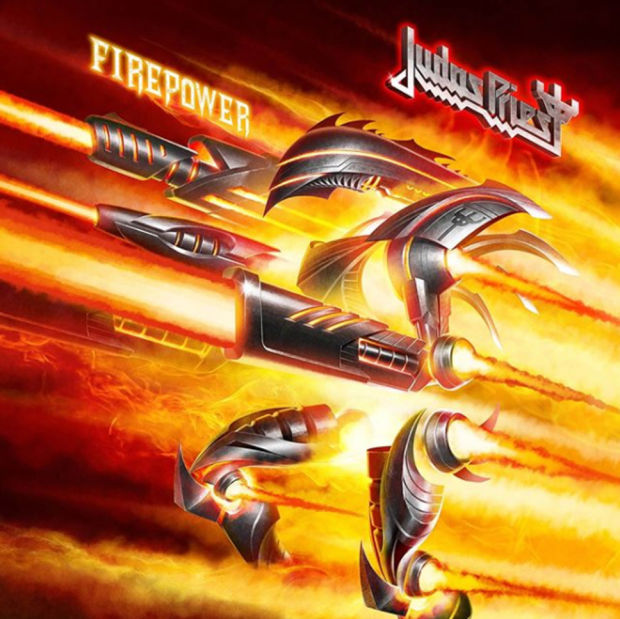
Tipton’s inability to tour with Priest likely won’t prevent the band from playing exciting sets with Faulkner and Sneap (ex-Sabbat, Hell)—but it effectively marks the end of an era. When longtime Priest guitarist K.K. Downing quit in 2011, the band stumbled for a moment, then regained its footing after discovering Faulkner, who literally saved the group.
“Richie came in at a time that was very shaky,” Halford admits. “We really didn’t have a band to speak of as we went out on the Epitaph tour. None of us knew if this was going to work, Richie included. But of course, it did. And we’ve moved on ever since.”
For the next six years, Faulkner capably took the second guitar slot and Downing’s absence was hardly crippling. It didn’t hurt that Faulkner’s flowing blonde tresses, leather attire and natural showmanship resembled a young Downing. But now that Tipton is unable to tour, it’s clear that the team that pioneered the twin-guitar attack and harmony leads in metal is a piece of history. If, as Tipton hopes, Priest returns to the studio when they finish touring for Firepower, they certainly have the skill to create another bracing album. But those who view the glass as half-empty will point out that Parkinson’s gets worse over time, and in two years from now—about the time Priest could record another record—Halford will be 68 and bassist Ian Hill will be 69.
If age is genuinely a state of mind, hopefully Judas Priest have a few good years left in the tank, but, as they’ve pointed out repeatedly in lyrics and artwork, no one escapes the hands of time. “Until you actually get into the routine of writing for the next album, you can’t say how difficult it’s gonna be,” Tipton concludes. “But, certainly, Firepower has got so much energy and diversity, it’s looking good, you know? It does make us ready to try to promote some more Priest classics. So we’ve definitely got a lot of enthusiasm at the moment.”
Source: www.guitarworld.com

